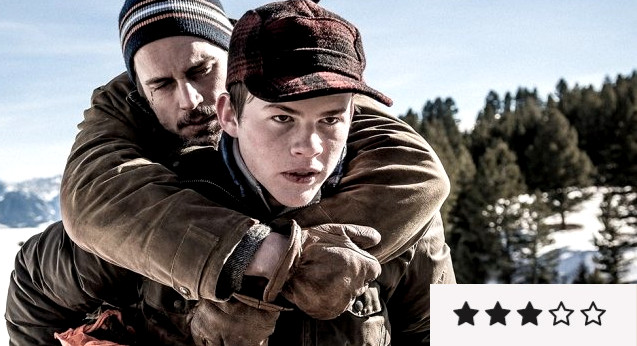Walking Out review: an affecting male weepie exploring father and son kinship

Will every male weepie released in the foreseeable future pale in comparison to The Grey? Director Joe Carnahan’s 2011 survival in the wilderness drama received a positive response from critics and audiences, yet the film’s greatness remains largely unrecognised. This is perhaps in part because it was marketed as a Liam Neeson vehicle, released in the thick of a glut of Neeson B movies including Clash of the Titans, Wrath of the Titans and Battleship.
Walking Out, from co-directors Alex and Andrew J. Smith, shares obvious similarities with Carnahan’s wintry drama, which heralded a perfect marriage of mainstream spectacle and pipe-chewing, macho-shedding philosophising. The directors have also made a film based in icy wilderness, starring exclusively male actors. And while Walking Out is hardly in the same league as The Grey, it is a reasonable companion piece given it focuses on a subject that cast a long shadow over Carnahan’s film, but was largely unexplored in it: the kinship between a father and son.
Walking Out almost entirely consists of scenes shared by two characters. A sense of melancholy is imparted from the first line of dialogue, when Cal (Matt Bomer) addresses his 14-year-old son David (Josh Wiggins) and asks, “you have a good year?” David has just landed at a small airport in Montana, geographically contextualised by long shots of beautiful snow-lined highlands, which wouldn’t look out of place in a documentary by Jennifer Peedom (director of Mountain and Sherpa). The politeness of a line of dialogue like that takes on sadness in the context of a parent talking to a child.
Matt Bomer and Josh Wiggins’ performances are moving in a slow-building way, buoyed by a gentle but affecting spirit.
The directors regularly return to visions of the mountains to reiterate the emotional distance between the pair, as they venture further into the wilderness. Cal, a hunter, informs David “you’re not going home until you get your first bird,” imploring him to “use his muscle memory” and “never leave what you shot behind.” Walking Out taps into a profound kind of frustration. Father longs to sculpt son in his image, imparting wisdom in the hope he will create a superior version of himself. Son wants something different: to become his own man, which typically involves rebelling against traditional figures of authority.
It becomes clear that we are in for the long haul with these characters, each of whom are more realistic than they are captivating. Cal is not a hugely likable person, though nor is he deserving of contempt. David is still in the process of finding himself, and thus by necessity something of a blank slate. Matt Bomer and Josh Wiggins’ performances are moving in a slow-building way, buoyed by a gentle but affecting spirit. The same can be said of the film’s direction, which leans on Todd McMullen’s handsome cinematography but is in essence human-focused.
The fellowship of the drama must, eventually, rupture in some way, pushing the story into more pronounced directions. That moment occurs, eventually, after the directors’ patience has begun to test the audience’s. The emotional pay-off is bittersweet, as, given the tone of the film, we always knew it was going to be. Among the profundities Walking Out communicates is a message about how, when it comes to absorbing life’s great lessons, the timing is rarely ideal. ‘Better late than never’ is a crude way of putting it, but it’s the right kind of sentiment.
Find times & tickets for Walking Out
















